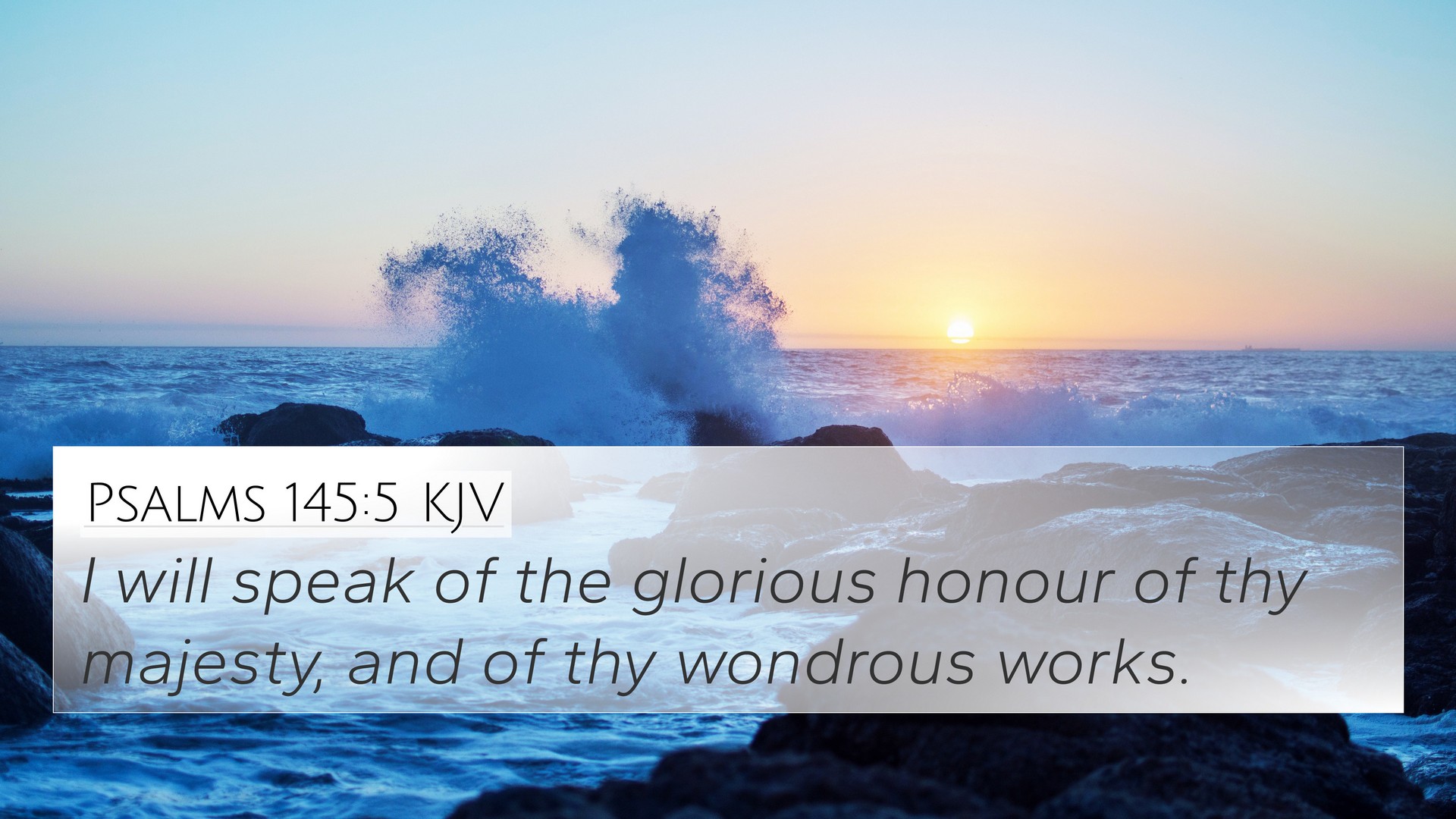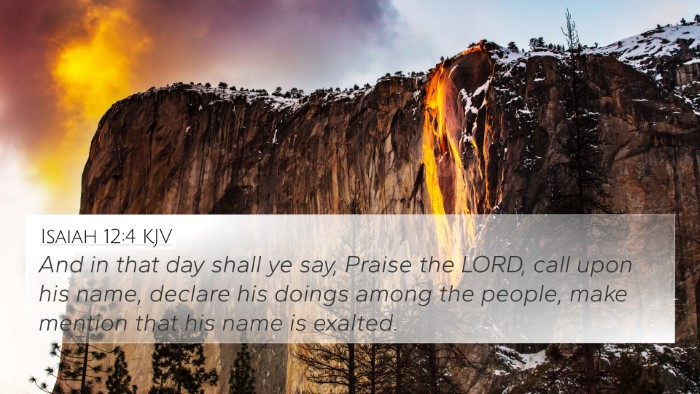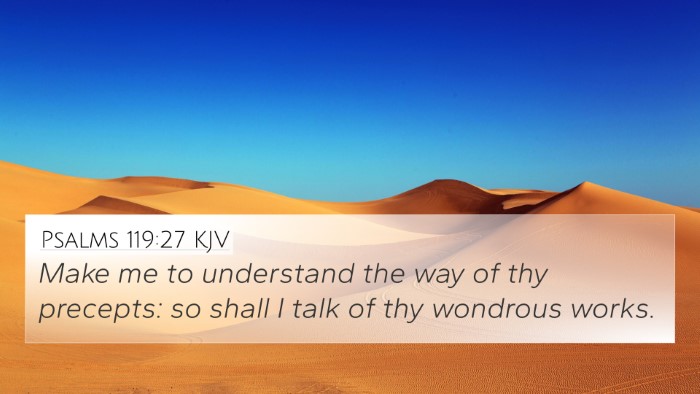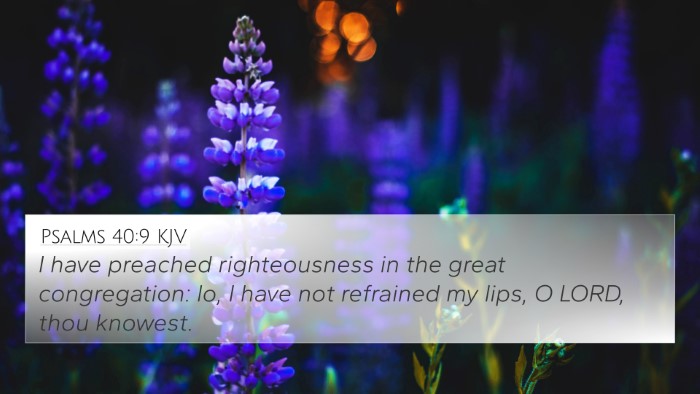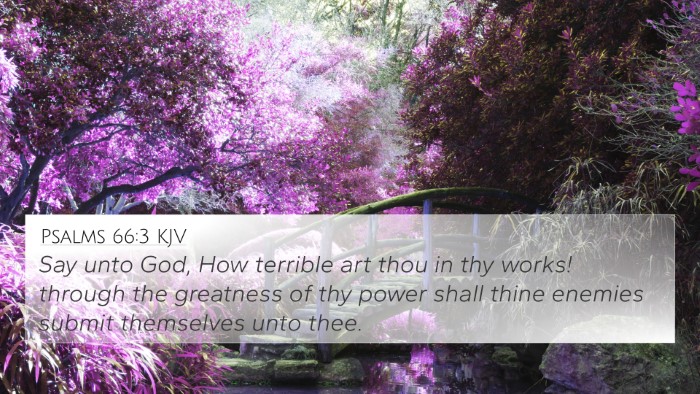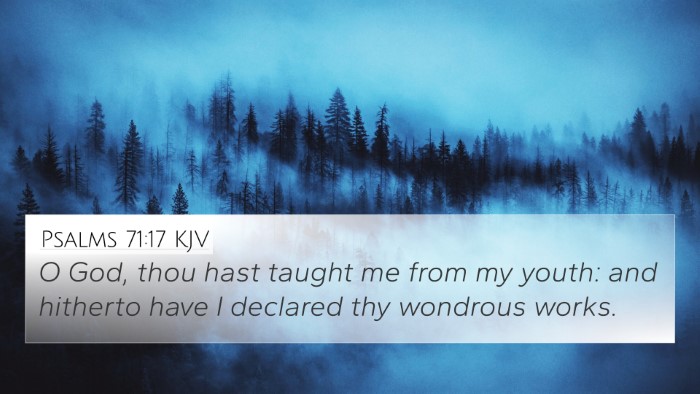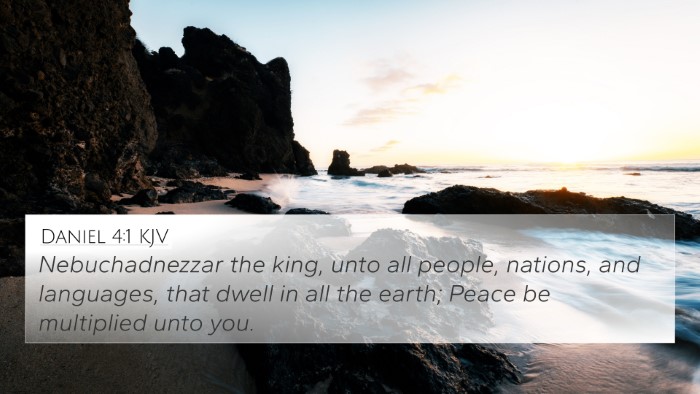Psalms 145:5 - Meaning and Interpretation
Bible Verse: Psalms 145:5 states, "I will meditate on your wonderful works." This verse emphasizes the importance of reflecting on the greatness of God’s deeds.
Summary of Insights from Public Domain Commentaries
This verse, as found in Psalms 145:5, invites believers to engage deeply with the nature of God's works. It suggests a focus on the wonderful acts of God, underscoring the value of meditation on His creations and actions.
Matthew Henry's Commentary
Matthew Henry highlights that this scripture should remind us of the glorious attributes of God as displayed through His works. Henry notes that God's wonders are manifold and reflect His power, love, mercy, and justice. When we meditate on His works, we are not merely considering historical events, but also how these divine actions affect our lives and encourage us in our faith journey.
Albert Barnes' Commentary
Barnes emphasizes the necessity of meditation in the life of a believer. He points out that pondering on God's wonderful works leads to spiritual growth and increases our gratitude towards Him. Barnes adds that understanding these works can foster a greater sense of awe and reverence for God's holiness, which can enhance our worship and relationship with Him.
Adam Clarke's Commentary
Adam Clarke provides an astute observation that meditation on God's works can lead to practical holiness in a believer’s life. He elucidates that reflecting on God’s past actions provides encouragement for present and future challenges. Clarke emphasizes that the more we appreciate God's past wonders, the more our faith is strengthened to trust Him in the present and for what lies ahead.
Exploring Cross-References
Understanding Psalms 145:5 can be enriched through cross-references to similar themes and ideas found throughout the Bible. Below are several notable connections:
- Psalms 77:12: "I will meditate on all your works and ponder your mighty deeds." - This verse mirrors the call to reflect on God's actions.
- Psalms 143:5: "I remember the days of old; I meditate on all your works; I muse on the work of your hands." - Also emphasizes the value of recalling God's past deeds.
- Philippians 4:8: "Finally, brothers, whatever is true, whatever is honorable, whatever is just, whatever is pure, whatever is lovely, whatever is commendable, if there is any excellence, if there is anything worthy of praise, think about these things." - Encourages purposeful meditation on positive and divine matters.
- 2 Timothy 3:16-17: "All Scripture is breathed out by God and profitable for teaching, for reproof, for correction, and for training in righteousness." - Connects with the idea of meditation on God’s word as a way of understanding His works.
- Romans 1:20: "For his invisible attributes, namely, his eternal power and divine nature, have been clearly perceived, ever since the creation of the world, in the things that have been made." - Highlights the fundamental revelation of God through creation.
- Psalms 105:5: "Remember the wondrous works that he has done, his miracles and the judgments he uttered." - A call to memory regarding God’s marvelous actions.
- Isaiah 63:7: "I will recount the steadfast love of the LORD, the praises of the LORD, according to all that the LORD has granted us." - Recounts God’s love and mercy, calling for remembrance and meditation.
Importance of Meditation on God's Works
The act of meditation is crucial for deepening one’s faith. When believers take time to reflect on God's wonderful works, it enriches their understanding of God’s character and strengthens their dependence on Him. This practice also results in a profound sense of gratitude and offers a source of comfort during challenging times.
Thematic Bible Verse Connections
In considering the themes present in Psalms 145:5, parallels can be drawn to other scriptural passages that reveal similar sentiments around meditation, praise, and the acknowledgment of God’s deeds:
- Psalms 30:12: "That my glory may sing your praise and not be silent. O LORD my God, I will give thanks to you forever!" - Reflects the commitment to continual praise.
- Psalm 119:27: "Make me understand the way of your precepts, and I will meditate on your wondrous works." - Aligns meditation with understanding and knowledge.
- Revelation 15:3: "And they sing the song of Moses, the servant of God, and the song of the Lamb, saying, 'Great and amazing are your deeds, O Lord God the Almighty!'" - Praises God’s marvelous works in song.
Cross-Referencing Biblical Texts
Cross-referencing various Biblical texts helps illuminate the interconnectedness of scriptures. These correlations show how themes of meditation, praise, and divine works resonate throughout both the Old and New Testaments:
- 1 Chronicles 16:9: "Sing to him; sing praises to him; tell of all his wondrous works!" - Connects singing with recounting God’s deeds.
- Hebrews 13:15: "Through him then let us continually offer up a sacrifice of praise to God, that is, the fruit of lips that acknowledge his name." - Encourages continuous acknowledgment of God’s works through praises.
Conclusion
Psalms 145:5 serves as a vital reminder of the importance of meditation on God’s wonders. By studying this verse along with its cross-references, believers can deepen their understanding of Scripture, enrich their faith, and enhance their spiritual lives. The act of meditation not only fosters a closer relationship with God but also equips us with the strength and assurance derived from reflecting on His faithful works throughout history.
